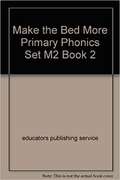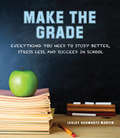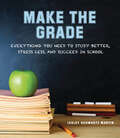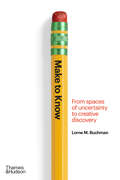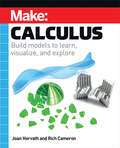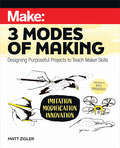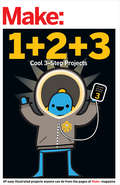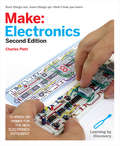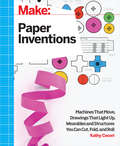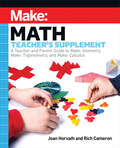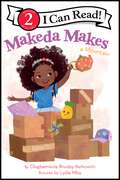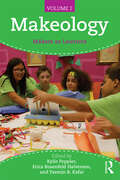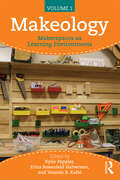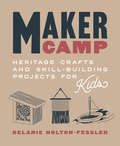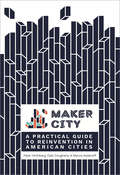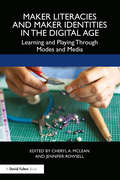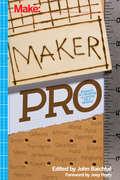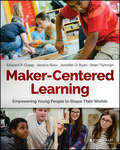- Table View
- List View
Make it Move: Independent Reading Pink 1B Non-fiction (Reading Champion #515)
by Katie WoolleyMake it Move is an informaiton book about pushing and pulling objects for children starting to learn to read. This book is part of Reading Champion, a series carefully linked to book bands to encourage independent reading skills, developed with Dr Sue Bodman and Glen Franklin of UCL Institute of Education (IOE)Reading Champion offers independent reading books for children to practise and reinforce their developing reading skills.Fantastic, original texts are accompanied by engaging artwork and a reading activity. Each book has been carefully graded so that it can be matched to a child's reading ability, encouraging reading for pleasure.
Make the Grade: Everything You Need to Study Better, Stress Less, and Succeed in School
by Lesley Schwartz MartinEvery teacher, every school, and every class is unique, but there are certain things that successful students have in common no matter where they are. Everyone needs to prioritize well, stay organized, and know how to study for different topics, but actually managing to achieve those goals isn’t easy or straightforward. Make the Grade dissects the school week as students actually experience it-and offers realistic solutions to common problems, from difficult teachers and over-booked schedules to boring homework and the endless variety of (more enjoyable) distractions. Inside you’ll also find: Sidebars that offer timesaving techniques, confidence-boosting exercises, and creative ways to add new studying skills Checklists to help ensure you do everything you can to set yourself up for success Charts and maps that provide clear, concise guidance in navigating difficult subjects and planning for future obstacles
Make the Grade: Everything You Need to Study Better, Stress Less, and Succeed in School
by Lesley Schwartz MartinEvery teacher, school, and class is unique, but there are certain things that successful students have in common no matter what. Make the Grade helps students everywhere stay on top of schoolwork by dissecting the school week as students actually experience it, and offering realistic solutions to common problems, from difficult teachers and over-booked schedules to boring homework and the endless variety of distractions. This book also includes sections on memory tricks, reading tips, note-taking, organization, and test preparation.
Make to Know: From Spaces of Uncertainty to Creative Discovery
by Lorne M. BuchmanA journey through the minds of some of the most creative people on the planet reveals that creativity is rarely a “lightbulb moment” and instead arrives through a process of making and self-understanding. The creative process is winding. It involves entertaining uncertainty and improvising new paths to knowing. In this insightful and informed book, Lorne M. Buchman, an international leader in art and design education and president of ArtCenter College of Design in Pasadena, California, guides readers through stories of a diverse and talented group of artists, entrepreneurs, innovators, and designers. Including such luminaries as Yves Béhar, Chris Kraus, Zack Snyder, Paula Scher, and Frank Gehry and businesses like Apple and Tesla who have changed the world as we know it, Buchman focuses on the revelatory nature of the creative journey itself. Michelangelo is said to have seen the angel in the stone and carved away until he set him free. Make to Know is about making as a path to knowing—presenting creativity as a “carving away” toward a revelation, not as a fully formed epiphany gleaned from a mysterious ether. As Buchman reveals throughout this provocative book, uncertainty is the space where discovery happens and where creators can be both playful and imaginative. Whether you’re an artist, designer, writer, daydreamer, or doodler, anyone can learn from these lessons on the varied paths to self-expression.
Make: Calculus
by Joan Horvath Rich CameronWhen Isaac Newton developed calculus in the 1600s, he was trying to tie together math and physics in an intuitive, geometrical way. But over time math and physics teaching became heavily weighted toward algebra, and less toward geometrical problem solving. However, many practicing mathematicians and physicists will get their intuition geometrically first and do the algebra later.Make:Calculus imagines how Newton might have used 3D printed models, construction toys, programming, craft materials, and an Arduino or two to teach calculus concepts in an intuitive way. The book uses as little reliance on algebra as possible while still retaining enough to allow comparison with a traditional curriculum.This book is not a traditional Calculus I textbook. Rather, it will take the reader on a tour of key concepts in calculus that lend themselves to hands-on projects. This book also defines terms and common symbols for them so that self-learners can learn more on their own.
Make: Designing Purposeful Projects to Teach Maker Skills
by Matt ZiglerThe Maker movement has been an excellent opportunity for people to become producers rather than just consumers, and schools are recognizing the value of offering students the tools, materials, and skills necessary to design sophisticated and meaningful projects. But teaching technical skills should not be the end goal: At its best, a Maker education teaches students to think and act in creative ways that can be applied to difficult challenges in all areas of life.Three Modes of Making provides a framework for Maker courses in upper grades that teach students creative-process skills through three key Maker modes: Imitation, Modification, and Innovation. Educators will learn the differences between the three Maker modes, their associated skill sets, and gain concrete methods to teach, document, and assess these skills. Through this approach, teachers will enable students to apply them to different creative needs.By focusing on how to teach skill development rather than merely how to build specific objects, Three Modes of Making enables students to improve and enhance their creative skills, and learn ways to apply them to a wide variety of challenges. This book is a road map to developing the creative problem solvers that the world needs for the future.
Make: Down-to-Earth Rocket Science
by Mike WesterfieldThis book teaches the reader to build rockets--powered by compressed air, water, and solid propellant--with the maximum possible fun, safety, and educational experience.Make: Rockets is for all the science geeks who look at the moon and try to figure out where Neil Armstrong walked, watch in awe as rockets lift off, and want to fly their own model rockets. Starting with the basics of rocket propulsion, readers will start out making rockets made from stuff lying around the house, and then move on up to air-, water-, and solid propellant-powered rockets. Most of the rockets in the book can be built from parts in the Estes Designer Special kit.
Make: Easy Electronics Projects for Parents and Kids
by Jaymes Dec Ji Sun LeeKid Crafts introduces younger children to the magic of electronics through the softer side of circuits! Young explorers will learn about electronics through sewing and craft projects aimed at maker parents and their children, elementary school teachers, and kids' activity leaders. Each project introduces new skills and new components in a progressive series of projects that take learners from the very basics to understanding how to use components such as sensors, transistors, and timers. The book is breezy, highly illustrated, and fun for everyone!
Make: From the Pages of Make:
by The Editors of Make:From the pages of Make: magazine comes this collection of dozens of projects you can make in your home or school workshop. You'll learn how to create toys and games from stuff you have lying around, create unusual and inspiring home improvements, and even find some new ways to have fun outdoors. You might even learn something along the way: electronics, flight, science, math, and engineering. In this book, you'll make:Batteries from everyday thingsBanana tattoosLED throwiesPiezo contact microphonePaper water bomberBox fan beef jerky
Make: Learning Through Discovery (Make Ser.)
by Charles Platt"This is teaching at its best!"--Hans Camenzind, inventor of the 555 timer (the world's most successful integrated circuit), and author of Much Ado About Almost Nothing: Man's Encounter with the Electron (Booklocker.com)"A fabulous book: well written, well paced, fun, and informative. I also love the sense of humor. It's very good at disarming the fear. And it's gorgeous. I'll be recommending this book highly."--Tom Igoe, author of Physical Computing and Making Things TalkA "magnificent and rewarding book. ... Every step of this structured instruction is expertly illustrated with photos and crisp diagrams. . . . This really is the best way to learn."--Kevin Kelly, in Cool ToolsThe first edition of Make: Electronics established a new benchmark for introductory texts. This second edition enhances that learning experience.Here you will find unique, photographically precise diagrams of breadboarded components, to help you build circuits with speed and precision. A new shopping guide and a simplified range of components, will minimize your investment in parts for the projects. A completely new section on the Arduino shows you how to write properly structured programs instead of just downloading other people's code. Projects have been reworked to provide additional features, and the book has been restructured to offer a step-by-step learning process that is as clear and visually pleasing on handheld devices as it is on paper. Full color is used throughout.As before, Make: Electronics begins with the basics. You'll see for yourself how components work--and what happens when they don't. You'll short out a battery and overheat an LED. You'll also open up a potentiometer and a relay to see what's inside. No other book gives you such an opportunity to learn from real-life experiences.Ultimately, you will build gadgets that have lasting value, and you'll have a complete understanding of how they work. From capacitors to transistors to microcontrollers--it's all here.Hans Camenzind, inventor of the 555 Timer (the world's most successful integrated circuit chip), said that "This is teaching at its best!" when he reviewed the first edition. Now the second edition offers even more!
Make: Learning by Discovery: A hands-on primer for the new electronics enthusiast
by Charles PlattMake: Electronics explores the properties and applications of discrete components that are the fundamental building blocks of circuit design. Understanding resistors, capacitors, transistors, inductors, diodes, and integrated circuit chips is essential even when using microcontrollers. Make: Electronics teaches the fundamentals and also provides advice on the tools and supplies that are necessary. Component kits are available, specifically developed for the third edition.
Make: Machines that Move, Drawings that Light Up, and Wearables and Structures You Can Cut, Fold, and Roll
by Kathy CeceriPaper is incredible stuff. It's easy to cut, but incredibly strong. It's disposable, but can last for centuries. It can stand as stiff as a board, pop up like a spring, or float like a leaf. And its invention changed the world forever. Perfect for kids, parents, and educators, Paper Inventions is a project-based book with full color illustrations, step-by-step instructions, supply lists, and templates that allow you to follow along with the book or devise something entirely new. Each chapter features new projects that will challenge and intrigue everyone, from beginning to experienced Makers. In this book, you'll learn to make: A light-up paper cat that shows how switches and sensors workAn action origami robot wormEdible rice paper perfect for secret messagesA space rover that moves thanks to paper machineryA paper generator that creates electricity when you tap or rub it Heat-activated paper models that fold themselvesA geodesic dome big enough to crawl into--from newspaper!
Make: Math Teacher's Supplement
by Joan Horvath Rich CameronMake: Math Teacher's Supplement is the essential guide for teachers, parents, and other educators wanting to supplement their curriculum with Joan Horvath and Rich Cameron's Make: Geometry, Make: Trigonometry, and Make: Calculus books.This book is a companion to the three math books, and does not duplicate the content in them. Drawing on the authors' experience guiding both students and teachers, it covers:The philosophy behind the Make: math book series, including the key inclusion of universal design principles to make the material accessible to those who learn differently A list of topics, projects, and needed maker skills, tied to the math book chapters Key learning objectives and associated assessment ideas A practical primer on 3D printing in an educational environment Helpful tips to manage student 3D printed workflow Five specific examples of ways to use content from the math books, including studying geometry with castles and using LEGO bricks to demonstrate calculus conceptsPacked with tips and links to online resources, Make: Math Teacher's Supplement will let you see how to build math intuition to create a solid base for your learner's future.
Makeda Makes a Birthday Treat (I Can Read Level 2)
by Olugbemisola Rhuday-PerkovichThe first title in a delightful new Level 2 I Can Read! series from acclaimed author Olugbemisola Rhuday-Perkovich and illustrator Lydia Mba, starring Makeda, an exuberant 7-year-old "maker" and problem solver who loves to create. Perfect for readers who love Rosie Revere, Engineer, and Reina Ramos Works It Out.It’s Makeda’s birthday! To celebrate, she is excited to make her marvelous coconut drops to share with the class.But everyone else brings cupcakes for their birthdays. Will her classmates like her special treat?Makeda Makes a Birthday Treat is a Level Two I Can Read book, geared for kids who read on their own but still need a little help. Whether shared at home or in a classroom, the engaging stories, longer sentences, and language play of Level Two books are proven to help kids take their next steps toward reading success.
Makeda Makes a Home for Subway (I Can Read Level 2)
by Olugbemisola Rhuday-PerkovichThe second title in a delightful new Level 2 I Can Read! series from acclaimed author Olugbemisola Rhuday-Perkovich and illustrator Lydia Mba, starring Makeda, an exuberant seven-year-old "maker" and problem solver who loves to create. Perfect for readers who love Rosie Revere, Engineer and Reina Ramos Works It Out.Makeda is excited to bring Subway, the class guinea pig, home for the weekend. But Subway seems S-A-D—so Makeda and her friend Glory decide to make him an F-U-N new cage to cheer him up. But what if what is fun for Makeda is not fun for Subway? This Level 2 I Can Read! book features an engaging story, longer sentences, and language play perfect for developing readers.
Makeda Makes a Mountain (I Can Read Level 2)
by Olugbemisola Rhuday-PerkovichThe third title in a delightful new Level 2 I Can Read! series from acclaimed author Olugbemisola Rhuday-Perkovich and illustrator Lydia Mba, starring Makeda, an exuberant seven-year-old "maker" and problem solver who loves to create. Perfect for readers who love Rosie Revere, Engineer and Reina Ramos Works It Out.Makeda and her family are cleaning the house for a party! They make a huge pile of items they don't use anymore, and soon it's time to take them away. But Makeda is not ready to throw anything out. Can she find new ways to use her old things? This Level 2 I Can Read! book features an engaging story, longer sentences, and language play perfect for developing readers.
Makeology: Makers as Learners (Volume 2)
by Yasmin B. Kafai Kylie Peppler Erica Rosenfeld HalversonMakeology introduces the emerging landscape of the Maker Movement and its connection to interest-driven learning. While the movement is fueled in part by new tools, technologies, and online communities available to today’s makers, its simultaneous emphasis on engaging the world through design and sharing with others harkens back to early educational predecessors including Froebel, Dewey, Montessori, and Papert. Makers as Learners (Volume 2) highlights leading researchers and practitioners as they discuss and share current perspectives on the Maker movement and research on educational outcomes in makerspaces. Each chapter closes with a set of practical takeaways for educators, researchers, and parents.
Makeology: Makerspaces as Learning Environments (Volume 1)
by Kylie Peppler, Erica Rosenfeld Halverson, and Yasmin B. KafaiMakeology introduces the emerging landscape of the Maker Movement and its connection to interest-driven learning. While the movement is fueled in part by new tools, technologies, and online communities available to today’s makers, its simultaneous emphasis on engaging the world through design and sharing with others harkens back to early educational predecessors including Froebel, Dewey, Montessori, and Papert. Makerspaces as Learning Environments (Volume 1) focuses on making in a variety of educational ecosystems, spanning nursery schools, K-12 environments, higher education, museums, and after-school spaces. Each chapter closes with a set of practical takeaways for educators, researchers, and parents.
Maker Camp: Heritage Crafts and Skill-Building Projects for Kids
by Delanie Holton-FesslerClassic and innovative hands-on projects for kids ages 3 and up designed to teach both heritage skills and how to think creatively.Handcraft is part of human nature: we build, we create, we innovate. The 20+ projects in this book from an experienced art educator weave a story of human innovation and creativity, from the very beginnings of building shelters in the woods to tinkering with recycled materials. Heritage skills teach children how to be independent and capable makers; fiber and wood projects offer rewarding crafts that also teach planning, preparation, and safe risk taking; and tinkering activities connect the low-tech process of making and doing with innovation. From soap carving and knot tying to building toy cars and junk robots, this book brings the fun of making things with your hands to young kids and links skills of the past with the present. The book also explores how to set up a maker space and teaches foundational workshop practices that can easily be applied to the home studio. Each project offers extensions for different ages and abilities and provides guiding questions to enrich the experience for both the maker (teacher/parent) and the apprentice (child) to encourage and celebrate creative, practical play.
Maker City: A Practical Guide for Reinventing American Cities
by Dale Dougherty Marcia Kadanoff Peter HirshbergThe Maker City Playbook is a comprehensive case studies and how-to information useful for city leaders, civic innovators, nonprofits, and others engaged in urban economic development. The Maker City Playbook is committed to going beyond stories to find patterns and discern promising practices to help city leaders make even more informed decisions.Maker City PlaybookChapter 1: Introduction and a Call to ActionChapter 2: The Maker movement and CitiesChapter 3: The Maker City as Open EcosystemChapter 4: Education and Learning in the Maker CityChapter 5: Workforce Development in the Maker CityChapter 6: Advanced Manufacturing and Supply Chain inside the Maker CityChapter 7: Real Estate Matters in the Maker CityChapter 8: Civic Engagement in the Maker CityChapter 9: The Future of the Maker CityMaker City Project is a collaboration between the Kauffman Foundation, the Gray Area for the Arts, and Maker Media.
Maker Literacies and Maker Identities in the Digital Age: Learning and Playing Through Modes and Media
by Cheryl A. McLean and Jennifer RowsellThis book explores “making” in the school curriculum in a period in which the ability to create and respond to digital artifacts is key and focuses on makerspaces in educational settings. Combining the arts with design to give a fuller picture of the engagement and wonder that unfolds with maker literacies, the book moves across such settings and themes as: Creativity and writing in classrooms Making and developing civic engagement Emotional experiences of making Race and gender in makerspace Game-based play and coding in schools and draws its case studies from the Netherlands, Finland, Canada, Australia, the United Kingdom, and the United States. Giving as broad a perspective on makerspaces, making, and design as possible, the book will help scholars expand their understandings and help educators appreciate the power and worth of making to inspire students. It is useful for anyone hoping to apply design, maker, and makerspace approaches to their teaching and learning.
Maker Pro: Essays on Making a Living as a Maker
by Adam Wolf John Baichtal Joe Meno David Gauntlett Alex Dyba Rob Klingberg Eri Gentry Susan Solarz Andrew 'Bunnie' Huang Tito Jankowski Mitch Altman Mike Hord Sophi Kravitz Michael Krumpus Wendy Jehanara Tremayne Jimmy DiRestaMaker Pro is a book of essays by more than a dozen prominent and up-and-coming professional makers (Maker Pros). Each essay includes advice and stories on topics such as starting a kit-making business, taking a hardware project open-source, and plenty of encouragement to "quit your day job." This book is a reference for anyone who dreams of turning a hobby into a small business, and features stories from well-known professional makers; it will turn aspiration into inspiration.
Maker-Centered Learning: Empowering Young People to Shape Their Worlds
by Shari Tishman Edward P. Clapp Jessica Ross Jennifer O. RyanThe Agency by Design guide to implementing maker-centered teaching and learning Maker-Centered Learning provides both a theoretical framework and practical resources for the educators, curriculum developers, librarians, administrators, and parents navigating this burgeoning field. Written by the expert team from the Agency by Design initiative at Harvard's Project Zero, this book Identifies a set of educational practices and ideas that define maker-centered learning, and introduces the focal concepts of maker empowerment and sensitivity to design. Shares cutting edge research that provides evidence of the benefits of maker-centered learning for students and education as a whole. Presents a clear Project Zero-based framework for maker-centered teaching and learning Includes valuable educator resources that can be applied in a variety of design and maker-centered learning environments Describes unique thinking routines that foster the primary maker capacities of looking closely, exploring complexity, and finding opportunity. A surge of voices from government, industry, and education have argued that, in order to equip the next generation for life and work in the decades ahead, it is vital to support maker-centered learning in various educational environments. Maker-Centered Learning provides insight into what that means, and offers tools and knowledge that can be applied anywhere that learning takes place.
Makers at School, Educational Robotics and Innovative Learning Environments: Research and Experiences from FabLearn Italy 2019, in the Italian Schools and Beyond (Lecture Notes in Networks and Systems #240)
by Andrea Monteriù David Scaradozzi Lorenzo Guasti Margherita Di Stasio Beatrice Miotti Paulo BliksteinThis open access book contains observations, outlines, and analyses of educational robotics methodologies and activities, and developments in the field of educational robotics emerging from the findings presented at FabLearn Italy 2019, the international conference that brought together researchers, teachers, educators and practitioners to discuss the principles of Making and educational robotics in formal, non-formal and informal education.The editors’ analysis of these extended versions of papers presented at FabLearn Italy 2019 highlight the latest findings on learning models based on Making and educational robotics. The authors investigate how innovative educational tools and methodologies can support a novel, more effective and more inclusive learner-centered approach to education. The following key topics are the focus of discussion: Makerspaces and Fab Labs in schools, a maker approach to teaching and learning; laboratory teaching and the maker approach, models, methods and instruments; curricular and non-curricular robotics in formal, non-formal and informal education; social and assistive robotics in education; the effect of innovative spaces and learning environments on the innovation of teaching, good practices and pilot projects.

